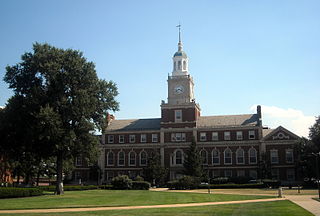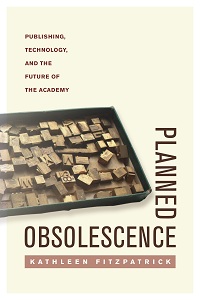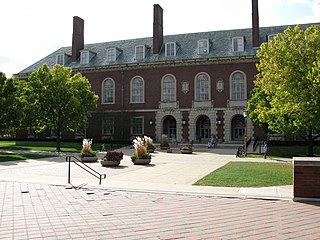Related Research Articles

Digitization is the process of converting information into a digital format. The result is the representation of an object, image, sound, document or signal by generating a series of numbers that describe a discrete set of points or samples. The result is called digital representation or, more specifically, a digital image, for the object, and digital form, for the signal. In modern practice, the digitized data is in the form of binary numbers, which facilitate processing by digital computers and other operations, but, strictly speaking, digitizing simply means the conversion of analog source material into a numerical format; the decimal or any other number system that can be used instead.
In library and archival science, digital preservation is a formal endeavor to ensure that digital information of continuing value remains accessible and usable. It involves planning, resource allocation, and application of preservation methods and technologies, and it combines policies, strategies and actions to ensure access to reformatted and "born-digital" content, regardless of the challenges of media failure and technological change. The goal of digital preservation is the accurate rendering of authenticated content over time. The Association for Library Collections and Technical Services Preservation and Reformatting Section of the American Library Association, defined digital preservation as combination of "policies, strategies and actions that ensure access to digital content over time." According to the Harrod's Librarian Glossary, digital preservation is the method of keeping digital material alive so that they remain usable as technological advances render original hardware and software specification obsolete.
An institutional repository is an archive for collecting, preserving, and disseminating digital copies of the intellectual output of an institution, particularly a research institution.

The Moorland–Spingarn Research Center (MSRC) in Washington, D.C., is located on the campus of Howard University on the first and ground floors of Founders Library. The MSRC is recognized as one of the world's largest and most comprehensive repositories for the documentation of the history and culture of people of African descent in Africa, the Americas, and other parts of the world. As one of Howard University's major research facilities, the MSRC collects, preserves, organizes and makes available for research a wide range of resources chronicling the Black experience. Thus, it maintains a tradition of service which dates to the formative years of Howard University, when materials related to Africa and African Americans were first acquired.
The California Digital Library (CDL) was founded by the University of California in 1997. Under the leadership of then UC President Richard C. Atkinson, the CDL’s original mission was to forge a better system for scholarly information management and improved support for teaching and research. In collaboration with the ten University of California Libraries and other partners, CDL assembled one of the world's largest digital research libraries. CDL facilitates the licensing of online materials and develops shared services used throughout the UC system. Building on the foundations of the Melvyl Catalog, CDL has developed one of the largest online library catalogs in the country and works in partnership with the UC campuses to bring the treasures of California's libraries, museums, and cultural heritage organizations to the world. CDL continues to explore how services such as digital curation, scholarly publishing, archiving and preservation support research throughout the information lifecycle.
Digital Commons is a commercial, hosted institutional repository platform owned by RELX Group. This hosted service, licensed by bepress, is used by over 500 academic institutions, healthcare centers, public libraries, and research centers to showcase their scholarly output and special collections.

Project MUSE, a non-profit collaboration between libraries and publishers, is an online database of peer-reviewed academic journals and electronic books. Project MUSE contains digital humanities and social science content from over 250 university presses and scholarly societies around the world. It is an aggregator of digital versions of academic journals, all of which are free of digital rights management (DRM). It operates as a third-party acquisition service like EBSCO, JSTOR, OverDrive, and ProQuest.
The University of British Columbia Library is the library system of the University of British Columbia (UBC). The library is one of the 124 members of the Association of Research Libraries (ARL). In 2017, UBC Library ranked 29th among members of the ARL for the number of volumes in library, making it the third largest Canadian academic library after the University of Toronto and the University of Alberta. However, UBC Library ranked 23rd for the titles held and second in Canada, and had a materials expenditures of $13.8 million, placing it 44th.
Scholarly communication involves the creation, publication, dissemination and discovery of academic research, primarily in peer-reviewed journals and books. It is “the system through which research and other scholarly writings are created, evaluated for quality, disseminated to the scholarly community, and preserved for future use." This primarily involves the publication of peer-reviewed academic journals, books and conference papers.
The Hamilton Library at the University of Hawaiʻi at Mānoa is the largest research library in the state of Hawaii. The Library serves as a key resource for the flagship Manoa campus as well as the other University of Hawaii system campuses.
The Center for Research Libraries is a consortium of North American universities, colleges, and independent research libraries, based on a buy-in concept for membership of the consortia. The consortium acquires and preserves traditional and digital resources for research and teaching and makes them available to member institutions through interlibrary loan and electronic delivery. It also gathers and analyzes data pertaining to the preservation of physical and digital resources, and fosters the sharing of expertise, in order to assist member libraries in maintaining their collections. The Center for Research Libraries was founded in 1949, as the Midwest Inter-Library Center (MILC). The traditional role of CRL was as an aggregator of tangible collection materials, however this has been updated in the digital age into the CRL's current role as a facilitator of collection development, digitization, and licensing collections by individual libraries and interest groups. This transformation required CRL to adopt new funding models from partnerships with key organizations, and an updated use of current technology to support community outreach and engagement. The funding was provided by the Andrew W. Mellon Foundation, the National Science Foundation, and the IMLS.

James G. Neal is an American librarian, library administrator, and a prominent figure in American and international library associations.
A digital library, also called an online library, an internet library, a digital repository, or a digital collection is an online database of digital objects that can include text, still images, audio, video, digital documents, or other digital media formats or a library accessible through the internet. Objects can consist of digitized content like print or photographs, as well as originally produced digital content like word processor files or social media posts. In addition to storing content, digital libraries provide means for organizing, searching, and retrieving the content contained in the collection.
DuraSpace was a 501(c)(3) not-for-profit organization founded in 2009 when the Fedora Commons organization and the DSpace Foundation, two of the largest providers of open source repository software for managing and providing access to digital content, joined their organizations. In July 2019 DuraSpace merged with LYRASIS, becoming a division of that organization.

Makerere University Library, established in 1949, is the oldest academic library in Uganda. In addition to its primary role as an academic library, it also serves as the national reference library and the legal depository of all works published in Uganda. It has been a depository for the United Nations since 1956.

Planned Obsolescence: Publishing, Technology, and the Future of the Academy is a book by Kathleen Fitzpatrick, Director of Scholarly Communication at the Modern Language Association and Visiting Research Professor of English at New York University, published by NYU Press on November 1, 2011. The book provides an overview of issues facing contemporary academic publishing, including the closing of academic presses and the increased pressure on faculty to publish to achieve tenure. Fitzpatrick's central argument is that academia should embrace the possibilities of digital publishing, which will in turn change the culture of academic writing and publishing.

The Hong Kong University of Science and Technology Library is housed in the Lee Shau Kee Library, located at the Hong Kong University of Science and Technology. It has over 1 million books, 728,426 printed volumes 754,146 in electronic format, as well as tens of thousands of e-journals, and streaming audio and video collections. A good part of its special collections, like its Antique Maps of China Collection has been digitized.

The University Library at the University of Illinois at Urbana–Champaign is the network of libraries, including both physical and virtual library spaces, which serves the University's students, faculty, and staff, as well as scholars and researchers worldwide. The University Library continues to evolve to serve the needs of the University of Illinois at Urbana–Champaign campus.